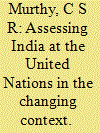|
|
|
Sort Order |
|
|
|
Items / Page
|
|
|
|
|
|
|
| Srl | Item |
| 1 |
ID:
113252


|
|
|
|
|
| Publication |
2010.
|
| Summary/Abstract |
The United Nations (UN) has been a useful instrument for India not only in pursuing its foreign policy goals effectively, but also for the progressive and peaceful transformation of the global political system. The changing priorities of the country's political leadership, the challenge of reconciling subjective interests with objective principles, the nuanced pursuit of non-alignment and sensitivity to the existing international system have historically worked as factors to create a mix of effects in India's performance in the world body. In the intricate agenda of the new century, India's participation highlights concerns on reinforcing the core strengths of the UN in managing non-traditional security threats, including transnational terrorism, mobilizing collective action in the era of globalization for minimizing the economic inequities, both within and between countries, and lastly revitalization of the UN structures including, in particular, the Security Council's composition through comprehensive reforms by common agreement. As for future strategy, the hope of replaying its past leadership role may be a less appropriate and acceptable option than building pragmatic and issue-based partnerships with all relevant countries in multilateral negotiation settings.
|
|
|
|
|
|
|
|
|
|
|
|
|
|
|
|
| 2 |
ID:
185308


|
|
|
| 3 |
ID:
049997


|
|
|
|
|
| Publication |
New Delhi, Indian National Commission for Cooperation with UNESCO, 1997.
|
| Description |
vii, 143p.
|
|
|
|
|
|
|
|
|
|
|
|
Copies: C:3/I:0,R:0,Q:0
Circulation
| Accession# | Call# | Current Location | Status | Policy | Location |
| 039514 | 341.2354/KRI 039514 | Main | On Shelf | General | |
| 039528 | 341.2354/KRI 039528 | Main | On Shelf | General | |
| D39514 | 341.2354/KRI D39514 | Main | On Shelf | General | |
|
|
|
|
| 4 |
ID:
049998


|
|
|
|
|
| Publication |
New Delhi, India International Centre, 1995.
|
| Description |
70p.
|
|
|
|
|
|
|
|
|
|
|
|
Copies: C:1/I:0,R:0,Q:0
Circulation
| Accession# | Call# | Current Location | Status | Policy | Location |
| 040178 | 341.2354/MUR 040178 | Main | On Shelf | General | |
|
|
|
|
| 5 |
ID:
004343


|
|
|
|
|
| Publication |
New Delhi, Lancers Books, 1993.
|
| Description |
217p.
|
| Standard Number |
8170950384
|
|
|
|
|
|
|
|
|
|
|
|
Copies: C:1/I:0,R:0,Q:0
Circulation
| Accession# | Call# | Current Location | Status | Policy | Location |
| 035092 | 327.2/MUR 035092 | Main | On Shelf | General | |
|
|
|
|
| 6 |
ID:
159977


|
|
|
|
|
| Summary/Abstract |
The role of the United Nations (UN) in response to the developments in the Arab world should be viewed in the context of the larger trends of thought and action in the world organization in promoting democracy as a norm during the past nearly two decades. The norm of establishing accountability as against impunity has found wide acceptance to define the relationship between the rulers and the ruled in the new century. Against this background, the great expectations about the UN as a powerful transformational tool toward democratization had received a setback with tempering experiences in responding to developments in Egypt, Libya, Syria, and Yemen since 2011. While the UN remained a bystander in Egypt in the wake of a coup against President Mohammed Morsi in 2013, it is striking that UN actions in Libya had cascading effect on its failure to act in Syria, which in turn produced a sense of fatigue in dealing with the situation in Yemen. In Libya’s case, the UN authorized military intervention did more harm than good to the cause of civilian protection and establishment of peaceful transition, but in Syria’s case, the military and political developments took place outside in the region and between major powers because of the diplomatic deadlock in the Security Council. Yemen comes out as a humanitarian nightmare, because of the exploitation of internal tribal suspicions by the regional geopolitical interests, which primarily spoiled all prospects of a promising role of the UN in providing a democratic framework of constitutional governance. The UN was unfortunately unable to exploit the opportunities thrown up by the Arab Spring as shown by its experiences in Libya, Syria, and Yemen.
|
|
|
|
|
|
|
|
|
|
|
|
|
|
|
|
|
|
|
|
|